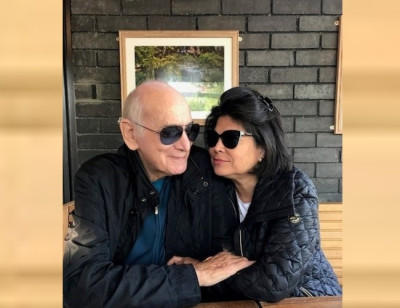
In previous years David, who fearlessly campaigned on behalf of Royal Free London (RFL) patients, helped lead the charge locally to raise awareness of organ donation.
Now, in his absence, Martha says she feels compelled to support the NHS Blood and Transplant and the RFL’s campaign this week to encourage people to make a difference by signing up to the organ donation register, which marks its 30th anniversary this year.
Martha said: “There is no way I could begin to step into David’s shoes but I feel passionately he would want me to take this opportunity to urge people to sign up to the organ register and make their wishes known in event of their death. I must do what I can.”
David was the chair of the RFL organ donation committee and life president of the Royal Free Hospital Kidney Patients Association (RFHKPA). He previously chaired the RFHKPA for many years.
David spent eight years on dialysis before receiving his first kidney transplant at the Royal Free Hospital in 1998. He then received a second kidney transplant in 2017, as part of a three-way paired and pooled kidney transplant exchange. As part of this, Martha donated one of her kidneys to a stranger so that all the operations could be successfully completed.
Martha said: “David was a remarkable individual whose life exemplified the values of compassion, inclusivity, and perseverance.”
At the age of 21 David opened his own advertising business but life took an unexpected turn when he faced the formidable challenge of kidney failure.
Martha said: “This diagnosis could have easily overshadowed his spirit, but instead, it ignited a new path for him. Rather than succumbing to despair, David redirected his talents and discipline toward understanding and addressing health issues. He immersed himself in research and collaboration,
dedicating countless hours to develop plans and initiatives that aimed to improve the lives of those facing similar health challenges. His ability to transform adversity into a driving force for good exemplified his character and resilience.”
Martha added: “David approached each day with dignity and courage, finding joy in the little things and inspiring those around him to do the same. His infectious laughter and positive outlook served as a beacon of hope not only for himself but also for countless others who were touched by his journey.”
Even with continued health complications, including a brain tumour that necessitated rigorous treatments like radiotherapy and chemotherapy, Martha says David never wavered in his resolve.
She said: “Each setback for David was met with the same tenacity and grace that had defined his life thus far. He harnessed his experiences to advocate for awareness and support for those battling similar illnesses, proving that even in the face of immense suffering, one can still make a meaningful impact on the lives of others.”
Fellow campaigners also paid tribute and spoke of their determination to champion organ donation.
Kirit Modi, MBE, honorary president of the National Kidney Federation, said: “David and I were very good friends and we worked together on several projects to promote organ donation among ethnic minority patients at the Royal Free Hospital. I will miss him greatly and it will be an honour to work with the trust and the patient association to build on his amazing legacy.”
Nii Plange, chair of the RFHKPA, said: “As we mark this important milestone for the organ donation register, we need to continue David’s tireless work to increase the number of people who have signed up to donate their organs after death.”
To find out more and confirm your decision, visit the NHS organ donor register at organdonation.nhs.uk. Users of the NHS app, can also use this to record, check or amend their details or decision.
 Translate
Translate